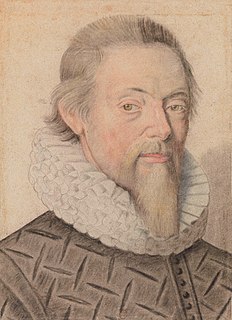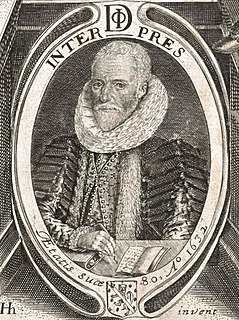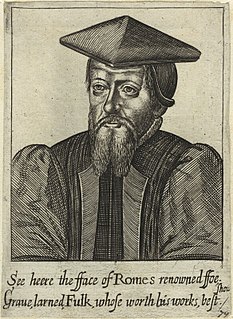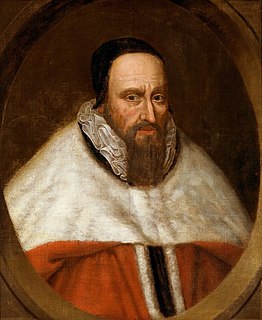Related Research Articles

Philippe de Mornay, seigneur du Plessis Marly, usually known as Du-Plessis-Mornay or Mornay Du Plessis, was a French Protestant writer and member of the anti-monarchist Monarchomaques.

Philemon Holland was an English schoolmaster, physician and translator. He is known for the first English translations of several works by Livy, Pliny the Elder, and Plutarch, and also for translating William Camden's Britannia into English.

Pierre Viret was a Swiss Reformed theologian, evangelist and Protestant reformer.

Robert Garnier was a French poet and dramatist. He published his first work while still a law-student at Toulouse, where he won a prize (1565) in the Académie des Jeux Floraux. It was a collection of lyrical pieces, now lost, entitled Plaintes amoureuses de Robert Garnier (1565). After some legal practice at the Parisian bar, he became conseiller du roi au siège présidial and sénéchaussée of Le Maine, his native district, and later lieutenant-général criminel. His friend Lacroix du Maine says that he enjoyed a great reputation as an orator. He was a distinguished magistrate, of considerable weight in his native province, who gave his leisure to literature, and whose merits as a poet were fully recognized by his own generation.

William Fulke was an English Puritan divine.

William Branthwaite (1563–1619) was an English scholar and translator.

The Venerable English College, commonly referred to as the English College, is a Catholic seminary in Rome, Italy, for the training of priests for England and Wales. It was founded in 1579 by William Allen on the model of the English College, Douai.
Anthony Wotton was an English clergyman and controversialist, of Puritan views. He was the first Gresham Professor of Divinity. Christopher Hill describes him as a Modernist and Ramist.
Thomas Newton was an English clergyman, poet, author and translator.
John Knewstub (1544–1624) was an English clergyman and one of the participants in the Hampton Court Conference of 1604 representing the Puritan side. Patrick Collinson calls him presbyterian by conviction, but moderate in his views.
Christopher Vitell, a Dutch carpenter or joiner from Southwark, was the first Familist preacher in England; though he subsequently recanted his belief when faced with death by burning. Vitell appears to have developed his Anabaptist beliefs from the Dutchman Henry Nicholis.
John Stockwood was an English clergyman, preacher, translator of Protestant texts and school-master.
Sir Humphrey Lynde (1579–1636) was an English lay Puritan controversialist and politician who sat in the House of Commons in 1626.
John Véron was a French Protestant controversialist and preacher, known for his activities in England.
Stephen or StephanBatman or Bateman was an English translator and author.

Edmund Withypoll, Esquire, of London, of Walthamstow, Essex, and of Ipswich, Suffolk, was an English merchant, money-lender, landowner, sheriff and politician, who established his family in his mother's native county of Suffolk, and built Christchurch Mansion, a distinguished surviving Tudor house, as his Ipswich home.
Thomas Rogers was an English Anglican clergyman, known as a theologian, controversialist and translator.
Edward White was a London printer and stationer whose career spanned a period of over forty years. His shop in the booksellers' district of St Paul's Churchyard was at the Sign of the Gun, where he sold many anonymous works as well as works by Thomas Kyd, Robert Greene, Anthony Munday and Christopher Marlowe. Between 1594 and 1611 he sold all three quartos of William Shakespeare's Titus Andronicus.
Andrew Noel or Nowell was an English landowner Member of Parliament.
Robert Brooke was one of two Members of the Parliament of England for the constituency of York between 1584 and 1586 and also between 1586 and 1588.
References
- ↑ "Brooke, John (BRK547J)". A Cambridge Alumni Database. University of Cambridge.
![]() This article incorporates text from a publication now in the public domain : "Brooke, John". Dictionary of National Biography . London: Smith, Elder & Co. 1885–1900.
This article incorporates text from a publication now in the public domain : "Brooke, John". Dictionary of National Biography . London: Smith, Elder & Co. 1885–1900.